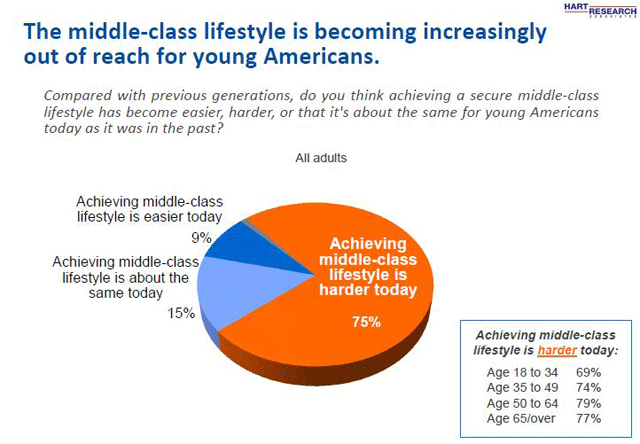Poll: American Dream more of a stretch for the young
Americans now believe it's easier for a family to fall from the middle class than it is to join it.
That's according to a new poll commissioned by the MacArthur Foundation, with just over 1,400 adults queried in the third annual national survey of housing attitudes conducted by Hart Research Associates in late April and early May.
Three in four, or 75 percent, believe achieving a middle-class lifestyle has become harder for young adults than in decades past, with 81 percent saying it will be harder for America's young to save for retirement than it was a generation ago (see chart below).
"People think it's an uphill climb for young people today to obtain and maintain and secure a middle-class lifestyle," Rebecca Naser, a senior analyst at Hart Research Associates, told CBS MoneyWatch. "At the root of this is people's incomes aren't adjusting upward in the same way."
Additionally, four in five, or 79 percent, of the survey's respondents said they believe it is more likely for middle-class people to fall into the lower rungs of the economic ladder than it is for those in lower economic classes to rise into the middle. The belief persists across political party, age and income.
Housing is key to the public's pessimism about the potential for social mobility, with a majority of Americans holding the view that the housing crisis persists, seven years after widespread mortgage defaults helped pull the United States into recession.
Three in five Americans, or 61 percent, said they believe that the country is still in the middle of the housing crisis or the worst is yet to come, the survey found.
Eight in 10 Americans said affordable housing is a problem, but don't have a clear idea of the role government should play in addressing the issue, the poll found.
"We prompted them to think about things the government could do, but it was very challenging for them to come up with ideas beyond the obvious," said Naser.
The bleak view belies a recent trio of reports that cast a more favorable spin on the housing market.
An index from the National Association of Realtors found sales of previously owned homes climbed 3.4 percent to a nine-year high in April, while figures from the Commerce Department found sales of new homes increased 6.8 percent in April.
And, housing prices are up 25 percent from their 2011 lows, and rest just 7.6 percent below their 2007 peak, according to the S&P/Case-Shiller index for April.
"In most of the cities covered in the Case-Shiller tiered price indexes, which show price changes for the lower, middle, and high tiers of the housing market, homes in the lower tier have seen the greatest price appreciation since 2000," Dean Baker, co-director of the Center for Economic and Policy Research, wrote in a blog post.
"Unless a lower income homeowner bought their home near the peak of the bubble, they are doing relatively well with their house price," Baker noted. "If homeowners bought near the peak of the bubble, which disproportionately affected lower income neighborhoods, then their prices would still be depressed."
While there's little doubt that the housing market has perked up, other data illustrate just how many Americans do not have the incomes or savings necessary to purchase a home.
Recent research from the Urban Institute suggests that the current home ownership rate of 63.7 percent will slide below 62 percent by 2020, and then stay near 61 percent by 2030, which would have it at its lowest level since the rate tracking started in 1965.
